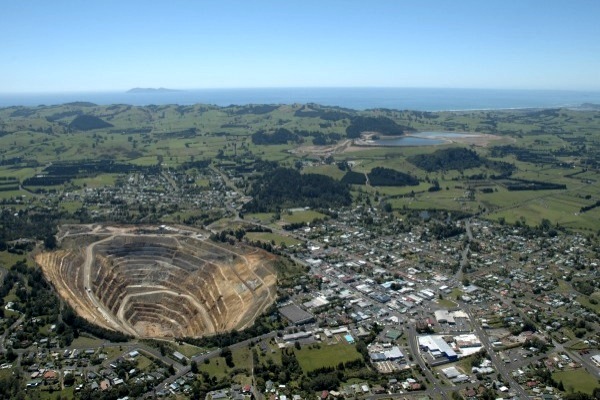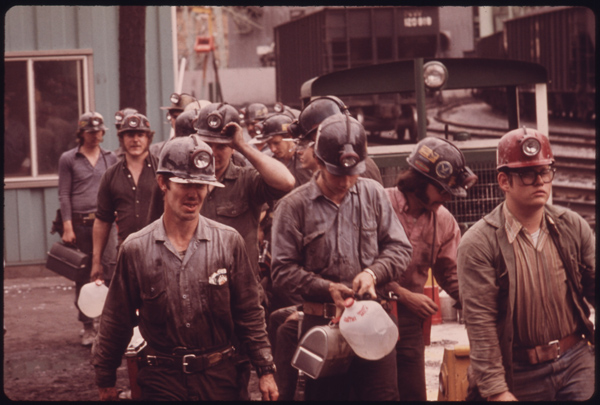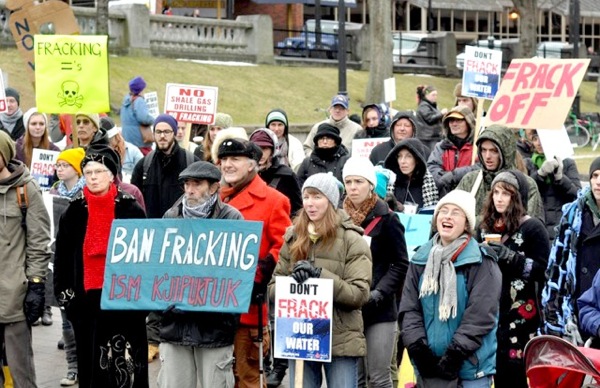Bargain hunters drive Molycorp shares 11% higher |
- Bargain hunters drive Molycorp shares 11% higher
- Halved since 2011, EPA rules to push coal price down another 20%
- Romania deals major blow to Gabriel Resources gold mine: on hold indefinitely
- Platinum price correction underway as strike deal edges closer
- Canadian studies endorsing fracking highly flawed — critics
- Areva office, ex-staffs homes raided by police over purchase probe
| Bargain hunters drive Molycorp shares 11% higher Posted: 04 Jun 2014 03:09 PM PDT Molycorp (NYSE: MCP) shares popped higher on Wednesday as bargain hunters stepped in after the stock hit its lowest level since its reincarnation five years ago. By the close Molycorp some 8.5 million shares had changed hands compared to the 5.5 million daily average with the counter closing at $2.79, up 11.6% on the day. Molycorp is a speculators' favourite and the closely watched stock regularly features among the most active on the New York stock exchange. No fresh positive news drove the price higher on Wednesday. But rumours about a possible takeover by a Chinese firm of the Colorado-based company to get hold of the technology it acquired with its Neo Material purchase are regularly dusted off (those same rumours have driven struggling Australian peer Lynas Corp's shares off its 52-week lows too). If anything speculation about Molycorp running out of money within a year and that it will be forced to tap markets again are only mounting. Last month Morgan Stanley warned about cash becoming tight at the rare earth miner due to possible revenue shortfalls after a slow ramp-up in volumes and detrimental sales mix based on lower sales of neodymium and praseodymium. Molycorp stock is still nearly 40% cheaper than before the release of another set of disappointing financials a month ago. The company reported an 18.5% year on year decline in Q1 revenues against expectations of an uptick and despite a 10% jump in sales volume over the final quarter of last year to 3,518 tonnes. That was due to average selling prices – falling 13% to $33.69/kg – continuing a protracted slump. That compares to full year average selling prices for 2013 of $42.26 per kilogram from its Mountain Pass, California mine and processing plant. |
| Halved since 2011, EPA rules to push coal price down another 20% Posted: 04 Jun 2014 01:09 PM PDT The International Energy Agency's latest forecast of energy trends for the next 20 years forecasts a significant fall in the share of fossil fuels in the global energy mix. Nevertheless to meet the world's energy demands through 2035, the cumulative investment in coal mining amounts to $735 billion, with a further $300 billion needed in transportation infrastructure, mainly railways. This over $1 trillion investment needed does not include the actual mining operation nor the costs of transporting the coal, which typically account for a large share of the delivered cost of coal. Investment in coal supply is much less expensive per equivalent unit of output than oil or gas and power-hungry China will be responsible for 40% of the world's investment in coal mining over the next couple of decades. The outlook in the US is very different. New legislation by the US Environmental Protection Agency announced this week virtually impossible to build new coal power plants in the country without carbon capture and sequestration (CSS) technology. It's noteworthy that the IEA figures takes into account the widespread adoption of CSS, an expensive and unproven technology, over the time period of its forecast. A new research note from Capital Economics says the EPA's new rules designed to curb US emissions of carbon dioxide from the power sector by as much as 30% from 2005 levels by 2030, will reduce the demand for coal and put downward pressure on prices. Over 90% of US coal is used for electricity generation, so even a small reduction in demand could have a large impact on prices. In addition, 15% of existing US coal burning capacity is due to be shut down by 2016 under the new rules: "Even before being passed, the EPA's legislation proposed in September has already effectively prevented new coal fired power plants from being built, as investors are unwilling to back a plant which may not be able to adhere to any new regulations. "Higher gas prices in the US over the last year have encouraged power plants to burn more coal and less gas, supporting coal prices. These regulations are likely to remove that support, even with higher gas prices, as clean burning gas is seen as the only feasible way to meet the new standards." From a pre-financial crisis peak of more than $190 a tonne, steam coal fell to $65 late by March 2009. The recovery was swift with prices more than doubling by January 2011 at more than $140. Since then the international thermal coal prices have been on a steady decline averaging $75 in May. Capital Economics sees the price falling to $60 a tonne by end of next year. |
| Romania deals major blow to Gabriel Resources gold mine: on hold indefinitely Posted: 04 Jun 2014 10:58 AM PDT  Located in the Apuseni mountains of west central Romania, the gold and silver Rosia Montana project would have become Europe's largest open-pit gold mine operation. Romania's lower house of parliament may have put the last nail in the coffin for Canada's Gabriel Resources (TSX:GBU) Rosia Montana project, by rejecting Tuesday a bill that would have allowed the firm to proceed with plans to set up Europe's biggest open-pit gold mine. The London-based company, reports Romania Insider, has put the mine plan on hold indefinitely, though it could theoretically be brought round if a new bill were sent forward at a later stage.  The bill, initially approved by the country's ruling party, drew thousands of anti-mine protesters into the streets last year. The bill, initially approved by the country's ruling party, drew thousands of anti-mine protesters into the streets across the European Union country last year, prompting the parliamentary commission appointed to rework the project to reject it in November. Things took a turn for the worse in December, when the Romanian Parliament ruled against a bill that would've allowed the Rosia Montana project to proceed. The lower house had the final say, and it clearly expressed its opposition to the draft law Tuesday with 302 votes against and only one in favour. For years Romanians have protested against Rosia Montana, which they deem as an environmentally risky project and an even larger problem of political corruption. The pollution concerns are tied to the company's planned use of cyanide to extract gold and silver from the ore. To date the company has waited more than 15 years for permits for the project, which costs are up to about $1.5 billion. While Gabriel Resources did not comment on the news, it has said in March it was unable at the time to provide shareholders with any guidance on time frames for its flagship project. |
| Platinum price correction underway as strike deal edges closer Posted: 04 Jun 2014 10:33 AM PDT Labour negotiations at South Africa's PGM mines are edging closer to a resolution as talks mediated by a ministerial task team continue. July platinum softened for a fifth session in a row on Wednesday to $1,433 an ounce and is down sharply from the $1,493 level less than two weeks ago over renewed hopes for an end to the strike and tensions between Russia and the Ukraine fading into the background. South Africa and Russia combined account for close to 80% of global supply of palladium and 70% of platinum output which are mainly used to clean emissions in automobiles. Palladium has outperformed its sister metal, with the price of June palladium trading flat on Wednesday at $837 an ounce, but not far off a three-year high. Palladium hit a record price of $865 in February 2011. More than 70,000 workers at the world's three largest platinum and palladium producers, Anglo American Platinum (LON:AAL), Impala Platinumm (OTCMKTS:IMPUY) and Lonmin (LON:LMI), have been on strike since January 23. Newly-installed Minister of Mineral Resources Ngoako Ramatlhodi said the team hoped to have a resolution by the end of the week while leader of the militant Amcu union Joseph Mathunjwa said the talks "went well". More meetings with both sides are scheduled for Thursday. The latest offer from mine management calls for a monthly increase of R800 ($75) a month every year for five years for those at the bottom of the pay scale and smaller hikes for those that earn more. The R800 equates to 16% pay increase for the first year for those earning the minimum of some R4,500 ($420) a month currently. Mathunjwa described a previous similar offer as simply a "repackaging". The companies' have lost combined revenue of R20.9 billion (some $1.9 billion) while striking workers have lost almost $900 million in forfeited wages. Roughly 10,000 ounces of platinum production and 5,000 ounces of palladium are lost each day the strike drags on. Even when strikers do return to work it would take up to three months to restart production. Despite the recent softening, the strike and a stand-off between the West and Russia over Ukraine have pushed the platinum price up 4% this year, while the palladium price has surged 16% this year to three-year highs. A huge factor boosting the the palladium price has been the launch of two new physical palladium-backed exchange traded funds in Johannesburg in late March. Holdings in palladium-backed ETFs rose to fresh record highs of more than 85 tonnes or over 3 million ounces as at 30 May following the launch of two physical palladium funds listed in Johannesburg a few weeks after the strike kicked off. Holdings in a platinum ETFs are also at an all-time high. Industry consultants Johnson Matthey Plc said in recent report platinum consumption will beat supply by 1.22 million ounces while the palladium shortfall will widen to 1.61 million ounces, from 371,000 ounces last year and the eighth year in a row of deficits. That would constitute the largest market deficits ever, based on Johnson Matthey data going back to 1975 for platinum and 1980 for palladium. |
| Canadian studies endorsing fracking highly flawed — critics Posted: 04 Jun 2014 08:58 AM PDT Critics are bashing two Canadian studies released Tuesday that concluded fracking doesn't pose serious risks to the Eastern province of Nova Scotia's groundwater supply. The two documents released Tuesday by a panel led by Cape Breton University president David Wheeler, suggest the debated extraction process just needs to be closely monitored and properly regulated, Canadian Press reported. The experts also said the province's reasonably stable geology would make contamination of drinking water wells less likely than in other areas. But opponents such as Jennifer Wes, a spokeswoman for the Halifax-based Ecology Action Centre, are claiming the studies are flawed, as they don't include any references or peer-review papers in any of them. She added that Nova Scotia doesn't have a good scientific grasp of its groundwater resources, which means it is not in a position to offer them much protection. Fracking activities in the Atlantic province have been on hold for almost two years. Last August, Energy Minister Charlie Parker commissioned the studies released Tuesday, aiming to obtain an independent review of the effects of the extractive practice, which will include public consultations. About 40% of the province's population gets its drinking water from sources other than municipal water systems, and the vast majority of these people rely on deep, groundwater wells. |
| Areva office, ex-staffs homes raided by police over purchase probe Posted: 04 Jun 2014 07:32 AM PDT  Former Areva CEO, Anne Lauvergeon, was once ranked as the world's 9th most powerful woman by Forbes magazine French police conducted Tuesday a dozen raids to state-controlled nuclear giant Areva's headquarters and the homes of former executives, as part of a probe into the controversial 2007 purchase of a Canadian uranium miner UraMin. The ongoing investigation focuses on the $2.5billion Areva's acquisition of UraMin, carried out at a height of demand for enriched uranium, which it later had to write-down. The search, says Le Monde (in French), follows a report leaked to the French media in May by France's public auditor, Cour des Comptes. The document was highly critical of decisions made by former chief executive Anne Lauvergeon, finding the company had mishandled the acquisition. Moreover, UraMin turned out to have far smaller uranium deposits than hoped, which pushed the value of the acquired mines to only $558 million. This is why the prosecutor in charge of the ongoing investigation, Le Monde reports, is looking into possible "presentation or publication of inaccurate or untrue accounts", "distribution of false or misleading information", and "forgery". But Lauvergeon, who led Areva for 10 years between 2001 and 2011, and who once was ranked as the world's 9th most powerful woman by Forbes magazine, blamed the UraMin writedown on the impact of the 2011 Fukushima nuclear disaster on uranium demand. Since then uranium prices have been hitting record lows. Although there's no spot price for the metal, UX Consulting's most recent indicator, published June 2, came to $28.25 a pound, which means the commodity is down about 31% over the last 12 months. Image from WikiMedia Commons. |
| You are subscribed to email updates from MINING.com To stop receiving these emails, you may unsubscribe now. | Email delivery powered by Google |
| Google Inc., 20 West Kinzie, Chicago IL USA 60610 | |


0 Comment for "Bargain hunters drive Molycorp shares 11% higher"